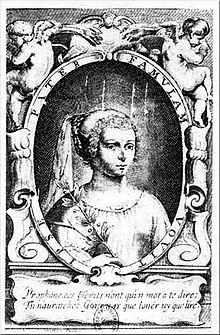- Marie de Gournay
-
French literature By category French literary history French writers Chronological list
Writers by category
Novelists · Playwrights
Poets · Essayists
Short story writersPortals France · Literature Marie de Gournay (6 October 1565, Paris - 13 July 1645) was a French writer, who wrote a novel and a number of other literary compositions, including two proto-feminist works, The Equality of Men and Women (1622) and The Ladies' Grievance (Les femmes et Grief des dames, 1626). In her novel Le Promenoir de M. de Montaigne qui traite de l’amour dans l’œuvre de Plutarque she explored the dangers women face when they become dependent on men. She insisted that women should be educated.
She was also an editor and commentator of Michel de Montaigne. Having read his works in her teens, Gournay travelled to meet him and eventually became his "fille d'alliance" (roughly "adopted daughter"). She receives her name from the Château de Gournay in Gournay-sur-Aronde (in the Ile-de-France Province) that her father, Guillaume Le Jars, bought shortly before dying in 1578.
After Montaigne's death, Gournay edited the third edition of the Essays in 1595 and it is for this that she is best known.
Contents
Life
Marie de Gournay met Montaigne in Paris in 1588, when she was 23 and Montaigne 55 years old. He later visited her at her residence in the Château de Gournay. The first literary reference to Marie as Montaigne's "fille d'alliance" is in the Essays (chap. XVII, II). After her mother's death in 1591, Marie moved to Paris, leaving the family home to her brother Charles, who was forced to sell it in 1608. Montaigne died the following year, and his widow, Françoise de Montaigne, provided Gournay with a copy of the Essays and charged her with its publication. Marie de Gournay did so, publishing the first posthumous edition of the Essays with a long preface praising Montaigne's ideas. Her translation of the Essays, is remarkable for fidelity in translating Latin sentences and Montaigne's highly specific references to classical and sometimes obscure texts.
In Paris, Marie de Gournay met Henri Louis Haber de Montmort and the scholar Justus Lipsius presented her to Europe as a woman of letters. Gournay found herself protectors by writing for Queen Margo, Henry IV of France, Marie de Médicis, Louis XIII, the marquise de Guercheville, the ministers Villeroy and Jeannin, and Richelieu. She thus obtained the privilege of being able to publish her own work from Richelieu and awarded her a modest royal stipend. As a woman, Marie de Gournay was often subject to both personal attacks and unfounded criticism of her work. She never married and supported herself through her inheritance and work.
As a Catholic, she was hostile to the Protestant movement but remained close to libertines such as Théophile de Viau, Gabriel Naudé and François La Mothe Le Vayer, to whom she would leave her library, which she herself had received from Montaigne (who in turn had inherited it from La Boétie). In 1610 she engaged in the debate on the assassination of Henry IV, strongly defending the Jesuits.
Marie de Gournay was self-taught in Latin and Greek. She translated works by Sallust, Ovid, Virgil, and Tacitus. She wrote verses about her cat Léonore (also the name of Montaigne's daughter) and Joan of Arc, adapted Ronsard, wrote on the instruction of princes, and criticized the Précieuses. She died on 13 July 1645, aged 79 and is buried at the Saint-Eustache Church in Paris.
Quotes
- "Happy are you, reader, if you do not belong to this sex to which all good is forbidden" [1]
Works
- Adieu de l'ame du Roy de France et de Navarre Henry le Grand à la Royne, avec la defence des Peres Jesuistes / par la damoiselle de G.
- L'ombre de la damoiselle de Gournay (1626, 1634 and 1641)
- Les advis ou Les présens de la demoiselle de Gournay (1634)
- Les essais de Michel seigneur de Montaigne : nouvelle édition exactement purgée des défauts des precedentes, selon le vray original, et enrichie & augmentée aux marges du nom des autheurs qui y sont citez, & de la version de leurs passages, avec des observations très importantes & necessaires pour le soulagement du lecteur, ensemble la vie de l'auteur, & deux tables, l'une des chapitres, & l'autre des principales matières, de beaucoup plus ample & plus utile que celles des dernieres éditions / [Henri Estienne] ; [Marie de Jars de Gournay]
- First volume of her complete works (1641) was published in 1997 by Rodopi
See also
References
- ^ Gournay, Marie de. Égalité des hommes et des femmes (1622)
External links
- Works accessible on Gallica's website
- Biography (French)
Categories:- 1565 births
- 1645 deaths
- Writers from Paris
- French nobility
- French novelists
- Women novelists
- French essayists
- Women essayists
- French women writers
- 17th-century women writers
- Feminist writers
- Latin–French translators
- Feminism and history
- Burials at Église Saint-Eustache, Paris
Wikimedia Foundation. 2010.

